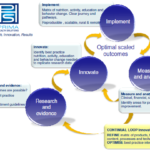A Guide for an Employee turned Entrepreneur

The first thing you need to understand before launching your own business, is the fact that just because you have previous experience in the industry, it doesn’t mean that you’re guaranteed success.
In fact, what you believe to be an insider’s perspective, isn’t an insider’s perspective, at all. Sure, knowing what it’s like to be in a certain post will give you just enough empathy to connect better to your employees, yet, it won’t do much to help you see and interpret the bigger picture.
It won’t help you develop a mindset required of an entrepreneur, which is crucial for success, regardless of the industry. With that in mind and without further ado, here are several tips for employees turned entrepreneurs or those who dream of becoming so.
1. Focus on what you know best
As a former employee, you have that one advantage and it’s a shame to let it go unused. The department that you’ve worked at has some shortcomings and drawbacks and you, as its former member, must know at least some of them. This means that if you dedicate yourself to the improvement of that single department, you can truly achieve a great leap forward. Most commonly, this is the key department, one in charge of sales or the one that directly provides services to the customers.
This makes a huge difference, seeing as how your competitors won’t know the game inside out. This, on the other hand, raises the question of what you should do with all the other areas of your business. If there’s a possibility for such a thing, it’s for the best to outsource.
2. Be careful when it comes to fraternization
The next problem is quite specific to employees turned entrepreneurs. You see, when it comes to hiring, you might feel the urge to bring some of your old colleagues to the team. On the plus side, they’re people who’ve already proven their worth, seeing as how a co-worker often has a better insight into who the slackers and who the hard-workers around the office are.
On the downside, the dynamic of your relationship will change (as it should) and this transition might not be as easy. Fraternizing with employees is a bad practice, however, it’s often hard for people to get accustomed to taking orders from those who were, up until yesterday, their equals. Other than this, you won’t be able to compose a team strictly made of old co-workers. Combining old and new talent is dangerous and it might lead to some bias or favoritism on your part. Averting this situation is also far from easy. Still, this doesn’t mean that you shouldn’t hire your old co-workers, or that this isn’t a situation-specific advantage.
3. Managing resources
One of the biggest differences between being an entrepreneur and being an employee lies in the fact that the latter works with the resources that the first one provides. As an entrepreneur, you’ll find yourself in a completely new scenario where you’re the one who needs to provide all these resources and materials. First of all, an entrepreneur needs to find the most cost-effective solutions for everything, from office supplies and appliances to the office space itself. Then, they need to see how all of this fits the budget.
Other than this, they need to provide a source of finance where all of this money would come from. We’re of course talking about the delicate and pivotal art of fundraising. The money can come from various sources, starting with crowdfunding all the way to money obtained through the personal loans. Just remember that each fundraising method has its own repercussions, regardless of whether it’s loss of control in your business or a high interest rate that you’ll eventually have to return.
4. Set up a business on a smaller scale
The next thing you need to take into consideration is the fact that all these new challenges may not be as overwhelming in nature as they are in volume. So, for the time being, it might be a good idea if you were to figure them out on a tad smaller scale. Trial and error is by far the most efficient didactic method there is and when you run a business on a smaller scale, you get to make a lot less costly errors. Needless to say, you’re taking a much safer route. The downside of this lies in the fact that your profits might end up being smaller, as well.

Conclusion
In other words, working within an industry before starting your own company in one of its niches is definitely a positive thing but it’s not an advantage that can guarantee success. The key to utilizing this properly lies in your ability to know all the advantages and disadvantages beforehand and find the way to use the first and avert (or at least mitigate) the latter. You also need to learn how to be an entrepreneur, which is a skill that doesn’t come hand in hand with being a specialist, a team leader or even a member of the junior management. It’s a whole different experience and the sooner you understand this, the better your odds will be.
Carolin Petterson is a businesswoman and content marketer with years of experience under her belt. She has had the opportunity to contribute to a number of popular business and marketing websites.







